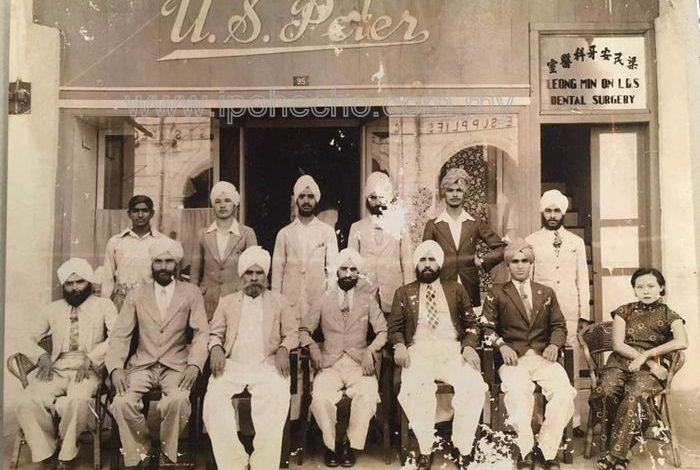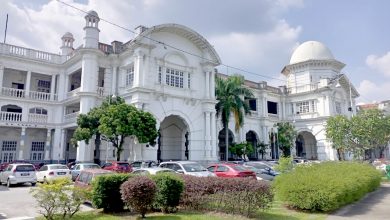

Cover Story
By Tan Mei Kuan
Did you know that the present site of Burps & Giggles boutique cafe was formerly a tailor shop named U.S. Peter? The keen-eyed ones would notice as its faded signboard, along Jalan Sultan Yussuf (Belfield Street), is visible and, happily, is retained by the new proprietor. Read on as we unveil the heart-warming story of a craft business born out of love by the late Sardar Pertap Singh.






U.S. Peter – More Than a Shop
How It All Began
In 1928, 21-year-old Sardar Pertap Singh from Jalandhar, Punjab arrived in Malaya on a ship with just a bag on his back looking for a job. A tailor back in India, he had heard so much about Malaya and decided to try his luck in the British colony.


Ipoh Echo spoke to 48-year-old Charanjeet Kaur, a granddaughter of Pertap for the full story. “U.S. Peter is named after my great grandfather, Utham Singh, thus ‘U.S.’. Meanwhile, ‘Pertap’ became ‘Peter’, the name given by the lady boss of the store where he worked since she could not pronounce the latter,” explained Charanjeet.
Leading a team of twelve tailors, Pertap sewed dresses, gowns and men’s clothing for the British officers and their wives for social events. He was known for his meticulous work and thus became a household name among the European community in Ipoh.
“He loved his job as a tailor and took pride in his sewing. Many who knew my late grandfather can attest to that. I used to look forward to visit him as I’d get new clothes each time,” Charanjeet enthused.
“According to my mother, Jasbir Kaur, my late grandfather’s family business back in Jalandhar, India was also tailoring. His uncles were tailors and he joined them soon after he obtained a certificate in tailoring. A British woman who was residing in Jalandhar taught my grandfather and his uncles the trade secrets and was their mentor,” she continued.
Overcoming Obstacles


A few months later, the shop was broken into and Pertap lost quality materials, most of the ready-tailored clothes as well as family jewellery which were kept in the shop. His business suffered subsequently but he continued to sew, as he had to repay his customers. Some of the generous ones passed the hat around to help him out.
Growing up in the shop, 78-year-old Jasbir Kaur recalled, “Although he lost everything he was always positive-minded. When business was booming we had new clothes almost every week. He was a well-respected figure in the community and was helpful to anyone in need.”
“It was his determination and hard work that we children admired the most,” she added. Jasbir and her older sister, the late Mahinder Kaur, learned tailoring to assist him.
After the robbery, Pertap started to sew for the local community and craft costumes for Indian classical dancers. The local tailors stayed back to help him while the rest went back to India. Eventually the local ones also left to look for greener pastures.
Remembering Pertap


Pertap’s third grandchild, 49-year-old Anuradha Rani chipped , “As a child what I remember most was a tuck shop inside my grandfather’s shop.”


Meanwhile, the seventh grandchild, Hanns Raaj Singh added, “He used to tell me stories about his past, especially during his time in Malaya. I used to play with his sewing tools and sit with him for hours to see him doing his work.”
“My grandfather was a soft-spoken and humble man. I remember he only wore a white shirt, white turban and dark-coloured pants (either black or blue). His always had his signature black umbrella as his walking aid. To this date, I still have the dress which he sewed for my third birthday,” Charanjeet shared.
“He’d take us to a Chinese restaurant, which is running till today, at the back of his shop lot for chee cheong fun (rice noodle roll),” she reminisced.
When asked for her views on the preservation of pre-war shops in Ipoh, she opined, “It’s a wonderful idea. There’s always a story waiting to be told like my grandfather’s shop.”
“My grandfather’s shop was abandoned for many years. When Ipoh City Council decided to transform the old Belfield Street into a heritage street, we’re pleased that our grandfather’s shop would be preserved for good. Plus, it’s a nice gesture for the owner of Burps & Giggles to retain the signboard and old decor as they were. Every time we are in Ipoh we will stop by the shop just to take a peek and feel a sense of pride seeing the signboard,” she elaborated.




Possible Reunion


Readers who remember that era or were friends with Pertap can get in touch with Charanjeet for a reunion by calling 016 274 4635 or email: charankaur6669@gmail.com


